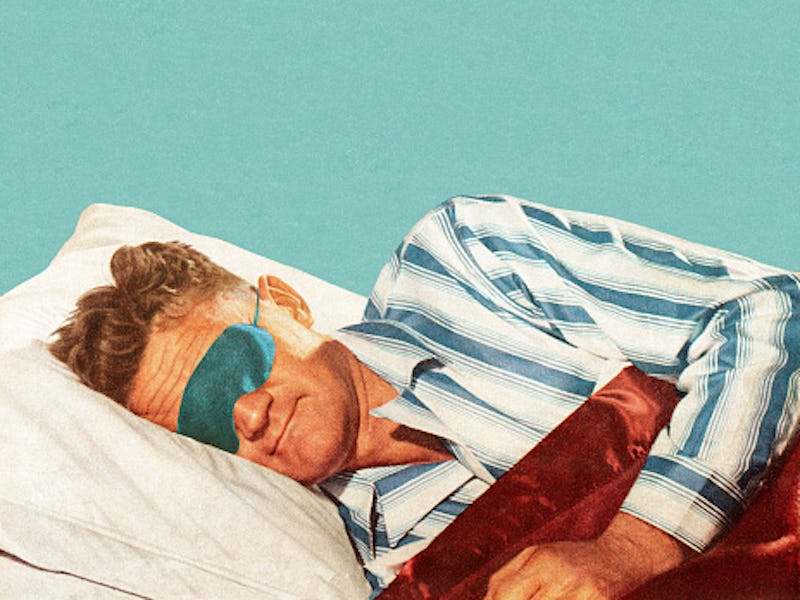Sleep and Covid-19: Experts offer 7 tips for not feeling so exhausted
“Mood and sleep are very tightly interwoven and difficult to tease apart.”

If you’ve recently taken a spin through social media or talked to friends or looked at a mirror, you’ve likely witnessed a recurring theme: People are exhausted.
Before this pandemic, Americans were not great at sleeping — more than one-third of Americans got less than seven hours of sleep a night.
That’s not great. If you’re between the ages of 18 and 64, you’re supposed to sleep between seven to nine hours. If you feel crummy after not sleeping enough, it makes sense. Studies link snoozing few too hours to a slough of unfavorable outcomes, including depression, poor memory, and premature aging. Because life is a highway, getting too much sleep can be bad for you, too.
Yet, somehow, Americans are feeling more tired now that they are dutifully confined to their homes. How can that be? Experts have some ideas — and strategies — that can be used to finally feel rested.
Alexandria Reynolds, an assistant professor of psychology at the University of Virginia’s College at Wise, tells me there’s no “one-size-fits-all” answer as to why people might feel exhausted in self-quarantine. The answer likely depends on a number of factors, including their sleep habits prior to self-isolation, their mental state, and their living situation.
If you’re feeling extra tired, consider your emotions.
“What could be happening is that the person is actually experiencing depression,” Reynolds tells Inverse. “Mood and sleep are very tightly interwoven and difficult to tease apart.”
Stress and anxiety also drive poor sleep and can manifest as sleeplessness. We are living through an uncertain time where we don’t know what tomorrow can bring. That can keep us from getting restful sleep.
Sean Drummond, a psychology professor at Monash University, explains that stress and anxiety can also create fatigue, as opposed to sleepiness, during the day. This fatigue can contribute to feelings of exhaustion, he tells Inverse.
And there is a difference between clocking sleep hours and getting restful sleep. Reynolds explains that many scientists would debate getting fewer hours of good quality sleep is better than getting a lot of poor quality sleep. In this case, six hours of quality sleep, where you cycle through all your sleep stages and cycles, would be better than eight hours of disrupted sleep.
“If you are waking up multiple times during the night, you are not giving your brain and body the chance to go through all the specific functions it is supposed to do during sleep,” she says.
Michael Scullin, the director of the Sleep Neuroscience and Cognition Laboratory at Baylor University, tells Inverse that another reason people may feel especially tired is that they are experiencing a change of multiple routines. People might feel more tired because their diet and exercise habits have changed. Sleep quality is generally improved when you exercise regularly, while alcohol and meals that are higher in sugar and saturated fats can affect sleep quality.
If you’re taking care of people while at home — like a parent who is ill or a child who is home from school — you will likely feel extra tired.
Stick to a sleep schedule where you maintain the same wake times and sleep times each day — even on the weekends.
Perhaps counterintuitively, you may also feel extra tired because your new routines have you exerting less energy. Daniel Kay, an assistant professor at Brigham Young University who specializes in sleep medicine research, describes sleep-wake states like a pendulum. The more active we are when we’re awake, the greater the swing back into a deeper level of sleep later. He argues that healthy sleep is about optimizing this polymerization. When the pendulum is disrupted, sleep is affected.
In the case of quarantine, people spend less time in the sun, people are less socially engaged, and they may be working less intensely. Overall, these factors are linked to reduced arousal during the day, which may be “one major factor contributing to feelings of sleepiness during the day. It basically allows the sleepiness that is present to manifest,” Kay tells Inverse.
Similarly, getting too much sleep can be making you extra tired during the day. Reynolds says there’s actually a term for feeling grogginess and achiness during the day after a long night of slumber: the “Rip Van Winkle effect.” Sleeping is great for a weekend or a vacation, she points out, but not for a month.
“Now, a person might find oneself sleeping 10 hours a day,” she says. “You would absolutely think that you should feel rested, but studies show that oversleeping might actually be possible, and spending too much time in bed attempting to sleep can make your body feel achy and tired.”
So what can you do to feel more rested? These experts offer 7 pieces of advice:
- Consistency is key. If you feel otherwise healthy, stick to a sleep schedule where you maintain the same wake times and sleep times each day — even on the weekends.
- Sunlight is an important factor in keeping your sleep on schedule. Try to get about 30 minutes of sunlight in the morning within a half-hour of waking up. This will set up your body rhythm for the day.
- Find time to exercise.
- Avoid screens within a few hours of bedtime.
- Avoid caffeine too close to bedtime. Reynold’s research shows it’s not how much caffeine you consume that impacts sleep but the time of day that you consume it.
- Limit dessert and add in food with high fiber. This should improve sleep quality and help one feel more energetic.
- If you feel worried or anxious, spend five to 10 minutes writing down every single worry. In a 2018 paper, Scullin and his team found that writing a to-do list before bed also helped people fall asleep faster.